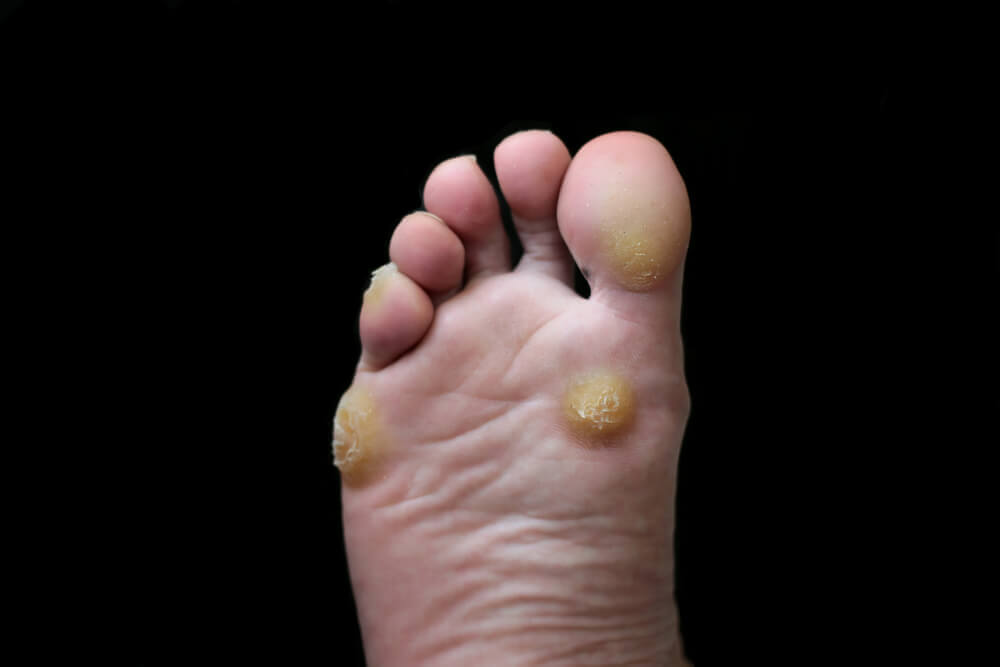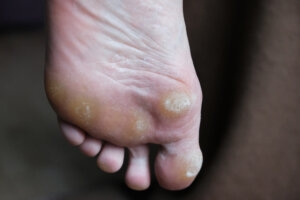
Ever wondered about callus on your feet?
Why do you get callus on your feet?
Callus on the feet is common problem. It forms as the skin’s response to friction and pressure. When you think about what your feet go through every day, it’s not surprising! They commonly form on the balls of the feet, the tops of the toes and around the heels.
Causes of Callus
The pressures on the skin cause cells to increase in number and the skin layers to thicken. This response helps to protect the skin against blistering.
(That’s not to say that if you develop a callus, you won’t get a blister. If the frictional forces get too much, then blisters can still develop in the deeper layers of the skin beneath the callus.)
Is all hard skin on the feet due to friction?
Most is, but there are certain other conditions and factors that can cause the skin to thicken and form dry, hard areas, (typically those dry, cracked heels we see lots of). These can include – psoriasis, freczema, and athlete’s foot, along with some other skin disorders, and medical conditions like hypothyroidism. Factors such as detergents, over-washing, age, and certain medications, can cause the skin to dry and thicken.
Small, isolated areas of callus can also actually be corns or verrucae rather than simply a callus.
How would Podiatrists treat callus on my feet?
As we’ve said before in our blogs, with any condition that we treat, diagnosis is the key. Podiatrists have a knowledge of the underlying structures and mechanics of the foot, and we always take a medical history from our patients. This, along with the skills we use in clinic, is why Podiatrists are well placed to advise on the causes and treatments for your callus.
Our treatment of choice for callus is gentle removal using a sterile blade. As callus on the feet is “dead skin,” (older skin cells with no nerve supply) this process is generally painless. We also use disposable files to achieve a smooth finish to our treatment. Our Podiatry degree training means we know to take caution with diabetic patients, those with vascular problems and some other skin and medical conditions. Keeping callus in check is important for these people as it can help to prevent skin breakdown.
After we have podiatrist callus removal, we can give advice on maintenance and prevention. This will help to slow down the process of the callus reforming and keep your feet happy for longer. Prevention is better than cure!
Reduction of callus with a blade is safe, quick, and clean and can give longer lasting results than peels and pedicures.
What about Pedicures and peels?
We get asked about foot peels and pedicures all the time. If these are carried out by experienced, qualified professionals then they can be absolutely fine.
However, just a word of caution on these. If chemical preparations are to be used on the skin, then a medical history and risk assessment should ideally be taken. Dry, thickened skin and callus isn’t generally evenly distributed, and chemical peels don’t differentiate between the thickened and normal skin. This can cause irritation to the normal areas of skin if not applied correctly. Also, care needs to be taken with any wounds, splits in the skin, dermatitis, eczema, psoriasis, diabetes, pregnancy, and breastfeeding. Most peels contain alkaline or acid ingredients such as sodium hydroxide and salicylic acid in varying concentrations, which can act as an irritant.
Many treatments contain tea tree oil as an added antifungal ingredient. The National Institute for Clinical Excellence (NICE) no longer recommends tea tree oil as a treatment for fungal nail and skin infections.
Can foot fungus cause calluses
As Podiatrists we follow NICE guidelines for our treatments, and if a fungal infection is suspected as a cause of skin thickening, we will recommend medicated antifungal preparations.
We would recommend finding your local HCPC registered Podiatrist to help diagnose and treat your callus and dry, hard skin.
If you would like help with your feet, you can book online to see us here .
For more information about your skin conditions, check out our other skin-related blog posts here
The NHS website also has information on calluses and corns here.
Frequently Asked Questions (FAQs)
Our method for treating foot calluses is gentle removal with a sterile blade, carried out by a Podiatrist. This procedure is carried out safely to effectively remove the thickened skin.
Plantar warts, caused by the human papillomavirus (HPV), can resemble calluses. They appear as rough, thickened skin and often have small black dots in the center.
Athletes often get calluses due to repeated friction and pressure from intense physical activity, poorly fitting footwear, and frequent running or jumping
Anna Conway
BSc (Hons), MCPod, SRCh, PGcert Podiatry
Owner, Lead Podiatrist


